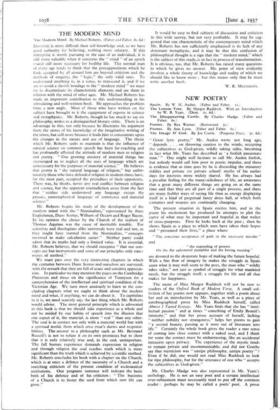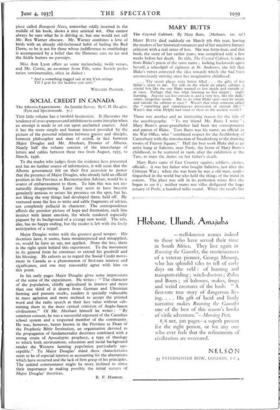NEW POETRY
Spain. By W. H. Auden. (Faber and Faber. Is.) The Lemon Tree. By Margot Ruddock. With an Introduction
by W. B. Yeats. (Dent. as. 6d.)
The Disappearing. Castle. By Charles Madge. (Faber and Faber. 6s.) Poems. By Rex Warner. (Boriswood. 5s.) Poems. By Ann Lyon. (Faber and Faber. 6s.) The Image 0' God. By Joe Corrie. (Porpoise Press. 3s. 6d.)
" Goon lyric poetry," Mr. Auden wrote not long ago, " depends . . . on throwing caution to the winds, accepting
the subjectives as God-given, wildly taking sides, becoming in fact what Mr. Yeats has described as ' a foolish passionate man.' " One might well hesitate to call Mr. Auden foolish, but nobody would call him poor in poetic impulse, and there is evidence that as time goes by he is discarding the minatory riddles and private (or private school) myths of his earlier days for interests more widely shared. He has always had a peculiar feeling for the many-sidedness of life, an awareness that a great many different things are going on at the same time and that they are all part of a single process, and there are many feebler ways of seeing life than as energy displaying itself in a kind of perpetual fancy dress ball, at which both costumes and wearers are continually changing.
The present situation in Spain excites him, and in the poem his excitement has produced he attempts to plot the curve of what may be important and hopeful in that welter of cross-purposes. First he looks back at the past ; then he shows Spain as a place to which men have taken their hopes and " presented their lives," a place where ." The conscious acceptance of guilt in the necessary murder" and " the expending of powers On the flat ephemeral pamphlet and the boring meeting "
are devoted to the desperate hope of making the future hopeful.
With a fine flow of imagery he makes the struggle in Spain seem what it may well seem to the poet, the man who " wildly
takes sides," not just as symbol of struggle for what mankind needs, but the struggle itself, a struggle for life and all that
makes for happiness.
The name of Miss Margot Ruddock will not be new to readers of the Oxford Book of Modern Verse. A small col- lection of her poems now appears, together with a poem about
her and an introduction by Mr. Yeats, as well as a piece of
autobiographical prose by Miss Ruddock herself, called Almost I Tasted Ecstasy. Mr: Yeats finds that she has " intel- lectual passion " and at times " something of Emily Brontt's intensity," and that her prose account of herself, lacking
" neither nobility nor strangeness," helps her poems to gain " a second beauty, passing as it were out of literature into life." Certainly the whole book gives the reader a rare sense of coming into close contact with a naked soul, and I think for some the contact must be embarrassing, like an' accidental intrusion upon privacy. The experience of the mystic tends to remain private and incommunicable, and did not Goethe say that mysticism was " unripe philosophy, unripe poetry " ? Even if he did, one would not read Miss Ruddock to look for ripe philosophy, but for the utterance of one who " accepts the subjectives as God-given."
Mr. Charles Madge was also represented in Mr. Yeats's
anthology. He is not an easy poet and a certain intellectual over-refinement must necessarily tend to put off the common reader : perhaps he may be called a poets' poet. A prose
piece called Bourgeois News, somewhat oddly inserted in the middle of his book, shows a nice satirical wit. One cannot always be sure what he is driving at, but one would not call Mr. Rex Warner obscure. Mr. Warner combines a love of birds with an already old-fashioned habit of hailing the Red Dawn, so he is not for those whose indifference to ornithology is accompanied by a belief that the Hammer cuts no ice and the Sickle butters no parsnips.
Miss Ann Lyon offers us some melancholy, twilit verses, and Mr. Corrie, an ex-miner from Fife, some Scotch prole-. tarian sentimentality, often in dialect :
" And a something tugged sair at my h'ert-strings Till I grat for the luckless wee sowl."
WILLIAM PLOMER.











































 Previous page
Previous page